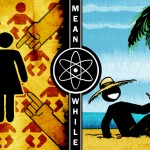Each Friday in Not Fit for Dinner, C. Ryan Knight explores political issues and the preconceptions guiding our understanding of and responses to them.
This week has been the best of weeks and the worst of weeks for America and its drone warfare. It counts among its successes the killing of two suspected Al-Qaeda operatives, one of whom was a high-profile operative. However, the American military also accepted responsibility for a botched attack resulting in the death of six civilians.
Salon’s Glenn Greenwald raises three important points in his reflections upon the death of civilians this week. He first says the ongoing death of civilians, euphemistically named collateral damage, damages “the moral character of a country.” He then calls attention to the obsessive attention paid to the failed underwear-bomb plot in contrast to the civilian deaths. Building on this second point, he concludes by briefly pointing out that the media’s lopsided coverage reinforces the “Good Guys v. Bad Guys” perception of the war, where the Good Guys are victims turned victors. His point is that those deemed as “Bad Guys” can also be, and oftentimes are, victims.
Alongside these concerns is the frequently-voiced fear that drone warfare turns war into little more than a video game for those with the technology needed to wage such a war. In a report to the UN Human Rights Council in 2010, the author expressed fear that “there is a risk of developing a ‘Playstation’ mentality to killing.”
While killing is the “name of the game” in many war games, there is no turning back the clock in real-time war. Once killed, real civilians do not magically reappear or resurrect when you restart the game. (This assumes, though, that war games actually include civilians; in “Civilians in War Games,” Drew Dixon called attention to a recent trend to exclude civilians from war games so as to “sanitize” the impulse of immature gamers to kill civilians for kicks and giggles.) The danger in the war-game mentality is that it drastically undervalues human life.
Civilians should be viewed as “the least of these” (Matthew 25.34-46), not as setbacks to accomplishing a mission. They are vulnerable and oftentimes have pressing needs which must be met. If the point of a war is to spread democracy yet civilians are thought of as nobodies (people who exist but whose lives mean almost nothing to us), there is a serious contradiction in the American gaming attitude toward war.
The treatment of civilians as nobodies is, I think, what primarily leads to the moral decadence against which Greenwald warns. To safeguard against this decadence, the call to develop and reveal “the full legal basis for targeted killings, including its interpretation of the legal issues” is desperately needed at the national and international levels. Firm consequences must be established for the death of civilians in addition to that legal basis for drone strikes (if it can even be reasonably called legal). The most obvious consequence needed is the trial of those who order strikes based on faulty information, resulting in civilian deaths.
At the personal level, Christians should reconsider how they think of civilians in war-torn countries like Afghanistan. If they are deeply saddened by the deaths of American soldiers but pay little attention to or care little about civilian deaths, this is a strong indication that their conception of “the least of these” is too narrow and restricted. We should not forget that our neighbors include those suffering as America continues its strikes against those suspected of plotting terrorism.











